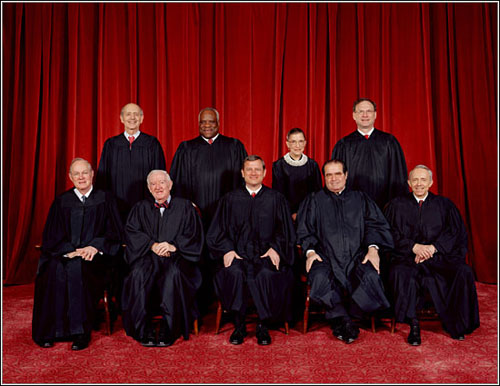
By Matt Drake, guest editorial
January 31, 2010
The United States Supreme Court recently decided Citizens United v. Federal Elections Commission. The Court’s opinion threw out restrictive regulations for corporate contributions of federal campaigns. Some legal decisions are bad for complicated or technical reasons. This is not one of those cases. This one is bad for the most obvious of reasons: corporations are not people.
The McCain-Feingold Act of 2002 placed some restrictions on what corporations could spend on political campaigns in the weeks before an election. This case was about regulating a certain kind of speech, immediately before an election. Under McCain-Feingold, corporate speech, in the form of donations to campaigns, was somewhat regulated. Of course, corporations were hardly silenced. Corporations were still free to form political action committees (PACs) to participate in the political process. Anyone with a television knows they were very capable of doing so.
Unfortunately, the Supreme Court, in its 5-4 partisan decision, went well beyond what it had to do, reversed its earlier decisions, and ruled that corporations should be treated like people when donating to political campaigns. The Court went on at great length about the risks of preventing corporations from speaking in political campaigns and how their inability to speak purported to damage our political process. Because it believes that any regulation would be too complicated to enforce, the Court threw out all regulations on speech by corporations.
The problem with this whole argument is that no one’s right to free speech was impaired. What is a corporation, anyway? It’s a piece of property owned by its shareholders. And while corporations have some legal rights (owning property, bringing lawsuits, etc.), they are not people and do not have the rights that actual people have (getting a drivers license, voting, etc.). Corporate personhood is not the same as actual personhood.
No person’s First Amendment rights are harmed when a corporation’s speech is limited. Even if corporations were completely silenced, their shareholders would be free to donate to whatever campaign they want. A corporation is a group of people, but the First Amendment should protect the rights of those people, not the rights of the corporation.
The dissent understands, saying: “Like all other natural persons, every shareholder of every corporation remains entirely free under Austin and McConnell [earlier cases that were overturned by this decision] to do however much electioneering she pleases outside of the corporate form.” Limiting the speech of a corporation does not limit the speech of people in any way. Unfortunately, the Court was unwilling or unable to see the difference.
What can be done? There’s no easy answer. There have been calls to amend the US Constitution, and some have called for a Constitutional Convention. One thing that just might work is changing the composition of the Supreme Court. The minority opinion, which I think was correct, had four votes. If Obama is reelected in 2012, it’s possible that he could replace one of the five votes in favor of corporate spending with someone who understands that corporations are not people. Granted that’s a long time to wait, but it may be our best option.
Matt Drake is the General Counsel of FlyCast and is running for the Board of Supervisors for District 6 in November. He lives in central SOMA.

Matt Drake


 The Hunger Site
The Hunger Site
No Comments
Comments for US Supreme Court Confuses Corporations
with Actual People are now closed.